Greater Good Gathering
And … we’re back
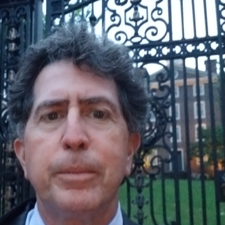 In case you hadn’t noticed, it’s been several months since I’ve written about, well, much of anything. I’ve been in the odd situation of being terribly swamped while having nothing to report – basically because I’ve been getting a lot of things lined up, which are now coming to fruition.
In case you hadn’t noticed, it’s been several months since I’ve written about, well, much of anything. I’ve been in the odd situation of being terribly swamped while having nothing to report – basically because I’ve been getting a lot of things lined up, which are now coming to fruition.
In my last update, way back in June, I promised that the next installment would be a detailed description of the new business I’m launching – VIRTU.US – a for-profit business intended to represent the “government” of the future.

Finishing that business plan consumed most of the summer, however, a big part of the reason you haven’t heard from me. VIRTU.US is now ready for launch, and you’ll be hearing about it in detail … in my next update. But, for now, I have a number of developments to catch you up on. First and foremost, after several months of discussion, the Greater Good Initiative has a new home – and dates for the second annual Gathering. Please mark your calendar for:
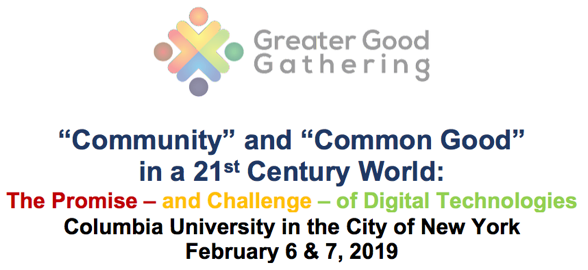
More details in a future update.
I’m also back this fall at my undergraduate alma mater, Brown University (pictured above), teaching a new graduate-level course, “Poverty, Redistribution and the Future of Work.” And I have invitations to teach at several other universities, which, again, I’ll discuss in more detail in a forthcoming update.
I’ve also been busy getting started on a new “boutique” appellate law practice, returning my government consulting work to its original goal of advising top elected officials on policy and strategy, and an exciting international initiative involving the families of Dr. Martin Luther King, Nelson Mandela and Mohandas Gandhi – all subjects for future updates, as well.
Finally, you haven’t been reading much writing from me of late because I’ve hardly done any. As you might know, US News & World Report – for about five years my major outlet, especially for time-sensitive, quick-turnaround analysis – ceased publishing its Opinion section in February. With The Atlantic also undergoing a major shake-up, I’ve spent most of 2018 seeking new writing platforms – and I’m happy to report that I soon will resume publishing more. In fact, a lot more. I’m still sorting out what exactly I will be doing where, since I want each publication to have a distinct “stream” from me, but it now looks like I’ll be writing for the following outlets:
● The Atlantic “Ideas channel,” where I’ll write on policy ideas with national implications, like my last two pieces there – on health care reform, and entitlement programs.
● For The Atlantic “Politics channel,” I plan to tackle the political and governmental implications of the “forces of the future”: global warming; technology-driven changes to labor and capital; the disappearance of truth and reality as we know them; why cyber warfare will require restructuring society itself; how bioscience will radically transform wealth and power worldwide; and the total “financialization” of the economy.
● For The New Republic, I’ll be writing monthly on what I call “Liberalism 3.0” – re-conceptualizing progressivism for the 21st Century.
● Replacing US News, my new quick-turnaround destination for timely commentary on news events will be (thanks to former Governor – and CNN commentator – Jennifer Granholm) … CNN. I’ll also be providing CNN a series I’ve long contemplated – using quirky international cultural features to make broader points about politics and the future (what Sacagawea dollars in Ecuador say about sovereignty, what a wine bar tells you about the break-up of governments): kinda “Anthony Bourdain in reverse.”
● Stratfor, the world’s leading global intelligence consultancy, recently republished a piece I wrote for Aspenia, the journal of the European branch of the Aspen Institute. I’ve now been asked to write for the former on an ongoing basis, where I’ll funnel most of my geopolitical prognostication, while writing for the latter (now my longest-running gig) whatever they ask me to write. In fact, my one piece this summer was a request from Aspenia for thoughts on the collapse of the center in American politics – so I’ll leave you with that:
Politics are no longer really arrayed along a line presenting something of a traditional bell curve, at the center of which lies the vast bulk of the population, forming, well, a “center.” Instead, whatever lines there may be lie on two separate planes that simply don’t intersect. The challenge today is not that, in William Butler Yeats’ famous formulation, “the center cannot hold”: It’s that there is no center anymore.
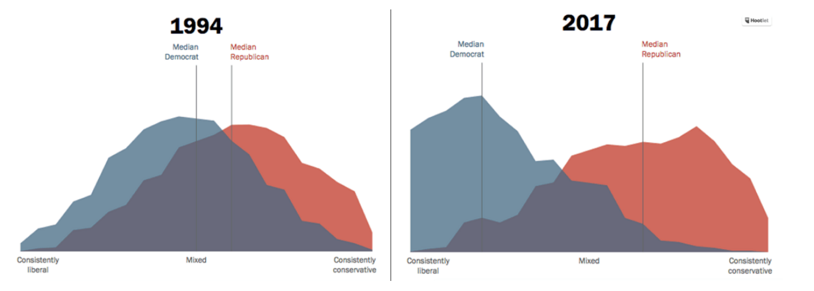
Read the full piece here.
I welcome your thoughts in the comments below.
Hey, You!
 In the weeks since I sent you my last update about the Greater Good Initiative, I’ve heard from, and talked with, many of you about what this initiative could become beyond an annual conference (and we’ve already started planning for the November 2018 installment – more in a future update!). As a result, I’ve made some progress – and now I’m hoping for some further input from you.
In the weeks since I sent you my last update about the Greater Good Initiative, I’ve heard from, and talked with, many of you about what this initiative could become beyond an annual conference (and we’ve already started planning for the November 2018 installment – more in a future update!). As a result, I’ve made some progress – and now I’m hoping for some further input from you.
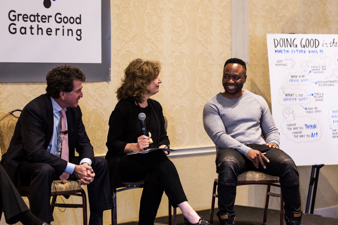
At the most grandiose extreme, some have suggested to me that the Greater Good should be the beginnings of a new political party. While we certainly need political change – on both sides of the aisle – a new party isn’t really viable under our system (and I’m not the guy to start it). The most “successful” third party in the U.S. was the Progressives … who were so successful they went out of business: The two established parties were forced to co-opt the Progressive agenda, which then essentially became the reigning American ideology for the bulk of the 20th Century. In short, we don’t need an alternative party so much as an alternative agenda that can play the same role in the 21st Century. And that does strike me as a good function for the Greater Good Initiative.
 While such an agenda starts with making government work better to redress injustice and unfairness, it also needs to address a broader range of mechanisms for change and social progress. We need to think of “governance” as something that occurs in institutions other than just the nation-state or the public sector, and “politics” as embracing not just governmental but also market and civil-society interactions (a point I made in this prior update).
While such an agenda starts with making government work better to redress injustice and unfairness, it also needs to address a broader range of mechanisms for change and social progress. We need to think of “governance” as something that occurs in institutions other than just the nation-state or the public sector, and “politics” as embracing not just governmental but also market and civil-society interactions (a point I made in this prior update).
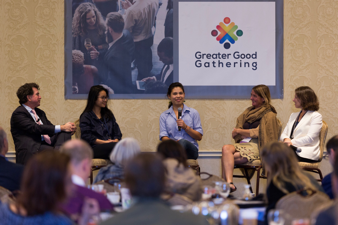 So I want to make sure that the Greater Good Initiative gets beyond simply political discussion and embraces civic and economic entrepreneurship – a key theme of the first Greater Good Gathering. In recent weeks, I’ve talked with several of the young social entrepreneurs who spoke at the conference (if you haven’t yet, you should watch the video highlights of their presentations) about how best to encourage and support people like them developing non-governmental solutions to social problems. Their answer lies – as in so many areas – in supportive networks of people and information. Some of that comes in the form of incubators and co-working spaces – but it also needs to come through non-location-specific networks. We need to incorporate mechanisms for developing, encouraging and supporting social entrepreneurship – the actual doing of social change – to make this initiative a web of individual actions advancing the greater good, not just calls for a government that does so.
So I want to make sure that the Greater Good Initiative gets beyond simply political discussion and embraces civic and economic entrepreneurship – a key theme of the first Greater Good Gathering. In recent weeks, I’ve talked with several of the young social entrepreneurs who spoke at the conference (if you haven’t yet, you should watch the video highlights of their presentations) about how best to encourage and support people like them developing non-governmental solutions to social problems. Their answer lies – as in so many areas – in supportive networks of people and information. Some of that comes in the form of incubators and co-working spaces – but it also needs to come through non-location-specific networks. We need to incorporate mechanisms for developing, encouraging and supporting social entrepreneurship – the actual doing of social change – to make this initiative a web of individual actions advancing the greater good, not just calls for a government that does so.
 Most people in fact have seen in the Greater Good Initiative some sort of “distributed” process, mirroring the way I’ve argued that technologies like blockchain are going to transform society and all power structures. Nevertheless, the literature on the burgeoning phenomenon of “leaderless movements” indicates they peter out without a well-defined agenda – and that agenda has to come from some sort of “elite” or “leadership.” So the challenge is how to create an agenda with expert input and leadership while retaining the essential character of a distributed, grass-roots movement. Rather than an institutionalized “think tank,” this requires a fluid thought process – assembling experts with diverse views to “think differently” and come up with answers that the political system, with its current no-compromise dynamic, won’t entertain.
Most people in fact have seen in the Greater Good Initiative some sort of “distributed” process, mirroring the way I’ve argued that technologies like blockchain are going to transform society and all power structures. Nevertheless, the literature on the burgeoning phenomenon of “leaderless movements” indicates they peter out without a well-defined agenda – and that agenda has to come from some sort of “elite” or “leadership.” So the challenge is how to create an agenda with expert input and leadership while retaining the essential character of a distributed, grass-roots movement. Rather than an institutionalized “think tank,” this requires a fluid thought process – assembling experts with diverse views to “think differently” and come up with answers that the political system, with its current no-compromise dynamic, won’t entertain.
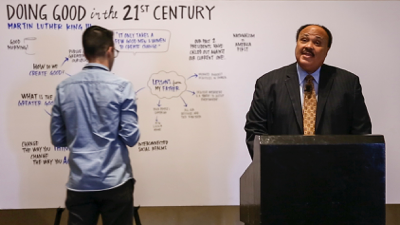 But this also can’t be just an elite-only, centralized process: This must be a process of discussion and dialogue that’s two-way, both vertically and horizontally, in which individuals and groups are free to devise their own agendas and solutions but also out of which broad consensus hopefully emerges – something like a live version of a “wiki” that starts with some sort of thoughtful core but not (like think tanks today) driven by a pre-existing ideological goal.
But this also can’t be just an elite-only, centralized process: This must be a process of discussion and dialogue that’s two-way, both vertically and horizontally, in which individuals and groups are free to devise their own agendas and solutions but also out of which broad consensus hopefully emerges – something like a live version of a “wiki” that starts with some sort of thoughtful core but not (like think tanks today) driven by a pre-existing ideological goal.
Each individual “node” in this network could follow its own model: a local “Greater Good Gathering” organized by folks in Gatlinburg, a monthly meet-up in Minnetonka, a “koffee klatch” in Kalamazoo, a book club in Bethesda, a discussion group in Des Moines, a social enterprise incubator in Inverness, or lone individuals in the Lone Star State, all contributing their concerns and solutions and feeding off the ideas of others in a dispersed national network devoted to building the Greater Good.
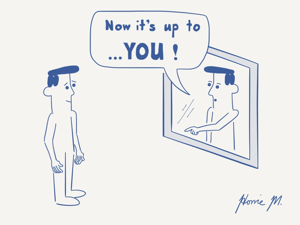 That’s what I’m working on building. How? I don’t know yet – that’s why I’m asking you. After all, that’s what’s gotten the concept this far. Please let me know your thoughts in the comments below or email me at eschnurer@public-works.org.
That’s what I’m working on building. How? I don’t know yet – that’s why I’m asking you. After all, that’s what’s gotten the concept this far. Please let me know your thoughts in the comments below or email me at eschnurer@public-works.org.
Thanks,

I Need Your Thoughts
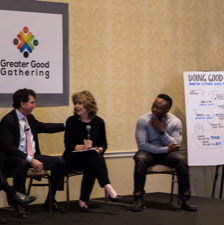 To kick off the New Year in a new way, I need your input on a new initiative.
To kick off the New Year in a new way, I need your input on a new initiative.
In coming weeks, I’ll be telling you about some new writing, teaching, and business activities. But all of these relate to my central concern that, in the years ahead, we need to think very differently about notions of common good, “public goods,” and governance. That’s where you come in.
A year or so ago, I pulled together a group from diverse backgrounds – government, politics, finance, non-profit, social venture, and technology – to brainstorm about these issues: With technology changing the ways we interact and make choices together as a community, a society, or even a planet, how can we define a new politics of common good beyond government? How do each of us pursue our commitment to this “greater good” – something bigger than our individual selves – in an increasingly atomized world?
What started as a small discussion group grew to over 100 on-going participants. And what interested them most was bringing even more people into this discussion – which produced the idea of a larger conference. That conference, the “Greater Good Gathering,” was held this fall.
Now, we need you.
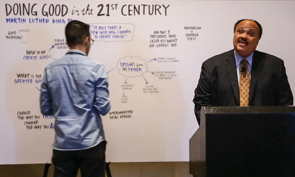
The conference featured Martin Luther King III’s keynote address on “Doing Good in the 21st Century,” an opening panel led by former Delaware Governor Jack Markell on improving government today, experts on the future of democracy, and an exploration of how public and private sector innovation might solve the health care problem.
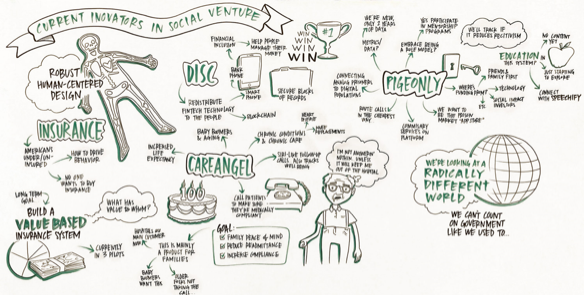
The heart of the conference was three panels thinking creatively across traditional categories of public, private and “social” enterprise:
One consisted of entrepreneurs behind for-profit (yes, for-profit) ventures to insure low-income families, to help families obtain public benefits, to help prisoners maintain family and community relationships, and to monitor the status of seniors living independently.
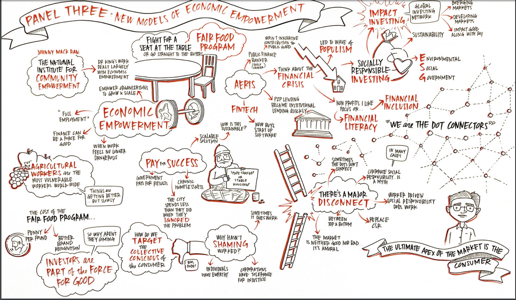 Another featured experts on how market forces are being tapped to increase social investment, shift “policy risk” from taxpayers to private investors, and induce large corporations to respond to issues like worker rights.
Another featured experts on how market forces are being tapped to increase social investment, shift “policy risk” from taxpayers to private investors, and induce large corporations to respond to issues like worker rights.
But perhaps the most enthusiastic group was the college students who had started self-sustaining enterprises to solve social problems:
– One student produces prosthetics for those in her native Viet Nam who have lost limbs from traffic accidents or landmines, at a fraction of market cost.
– Others started a business to speed the processing of rape kits.
– Another markets technology to help his fellow dyslexics with their reading.
– One uses food waste to produce insects that replace fish as chicken feed (reducing overfishing).
– Still another builds client relationship management software for homelessness service agencies.
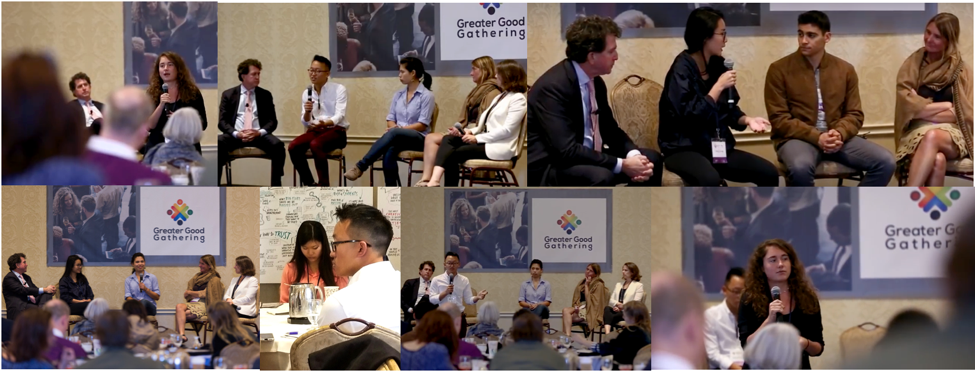 These young people are truly inspiring – but, in the timeworn manner of entrepreneurs everywhere, they hadn’t set out to change the world, or to make a buck: They simply saw a problem and, instead of just asking why, asked “why not?” At one point, when I questioned the director of a social venture fund about what she thought the field would look like in a decade, her answer was that there would be no distinction between social enterprise and “normal” businesses: All businesses will be “social ventures” – promoting the greater good even while making a profit.
These young people are truly inspiring – but, in the timeworn manner of entrepreneurs everywhere, they hadn’t set out to change the world, or to make a buck: They simply saw a problem and, instead of just asking why, asked “why not?” At one point, when I questioned the director of a social venture fund about what she thought the field would look like in a decade, her answer was that there would be no distinction between social enterprise and “normal” businesses: All businesses will be “social ventures” – promoting the greater good even while making a profit.
Organizing the conference, I was struck by how many people – venture capitalists, former White House officials and Cabinet secretaries, non-profit leaders and intellectual innovators – asked me to keep them “plugged in” in a way that implied that this wasn’t just a conference, or a one-time event: Something about this notion of pursuing the “greater good” really struck a chord. People are looking for new paths for making a difference, seeking the social relevance many used to look for in government … somewhere other than government.
People have suggested to me various forms this Greater Good Initiative could take:
– A think tank – or “institute” – to address these issues (my original intention).
– Smaller conferences, more frequently, in a variety of locations.
– “Franchising” the Greater Good concept to anyone, anywhere who wants to stage similar, local conversations – like TEDx – or building local organizations for people to meet and plan, like MeetUp groups.
– Building a virtual national community and ongoing conversation online.
– A political movement.
– A foundation.
– A venture fund to support young (or even not-so-young) entrepreneurs in developing sustainable solutions to societal challenges.
– Maybe all these things.
– Maybe something else entirely.
What’s the best answer? I don’t know. But I’d like your help in figuring it out: What I do know is that we won’t advance the greater good if we don’t advance it together. Please visit my blog, or email me, so you can share your ideas – and get “plugged in” as we move forward.
Quick Links – Conference Videos:
Public Section Innovation: Can Government Be Saved?
Martin Luther King III: Doing Good in the 21st Century
Defending Democracy & The Future of the Public Good
Current Innovations in Social Venture
The Next Generation of Innovators
New Models of Economic Empowerment
Application & Illustration – The Future of Health Care Reform
Death and Life
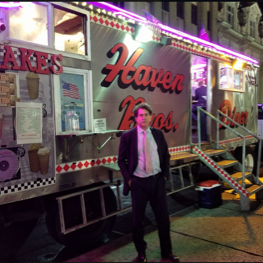 This past weekend was the first Greater Good Gathering – something I hope will become not just an annual event but part of a larger initiative to promote the “greater good” globally. What does this mean? I’ll be discussing that in more detail in several articles and in a future update – but you can already read this coverage of the conference:
This past weekend was the first Greater Good Gathering – something I hope will become not just an annual event but part of a larger initiative to promote the “greater good” globally. What does this mean? I’ll be discussing that in more detail in several articles and in a future update – but you can already read this coverage of the conference:
Greater Good Conference Holds Inaugural Gathering
A Gathering Seeks Levers to Rebuild Common Good
In my own remarks at the conference, I defined my view of “the greater good” as something not partisan or ideological, but rather simply “advancing the good of others than just yourself.” Below is one of the “graphic illustrations” from the conference, summarizing my remarks.
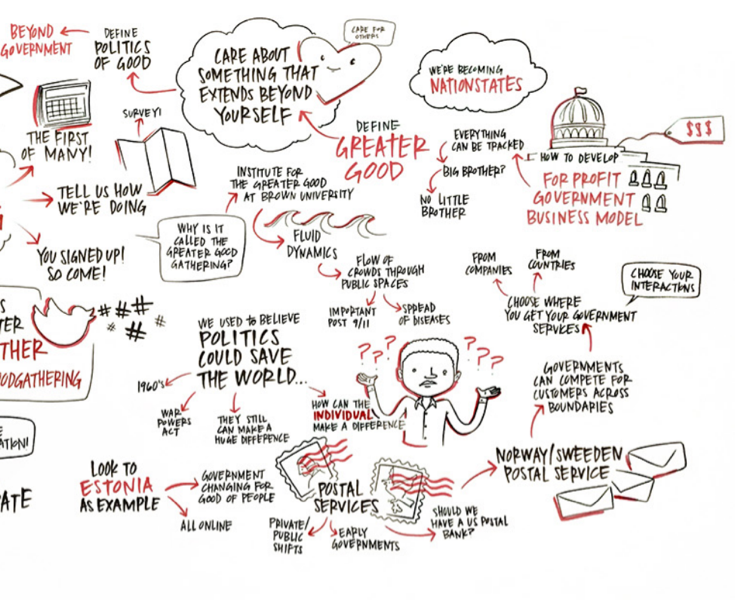 A similar theme was struck by our keynote speaker, Martin Luther King III:
A similar theme was struck by our keynote speaker, Martin Luther King III:
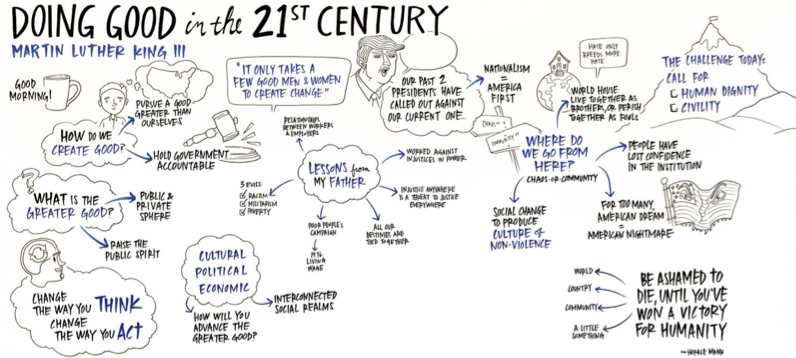
As I discussed in my piece this week for US News & World Report, Live More Life, “For me, this has always been the basis for a particular concern with justice and fairness.” The article relates these “macro” issues to more personal concerns that start from my learning during the conference that one of our cats was dying. “I’ve come to see these passings as less about the awesome finality of death than the wonder of life,” I wrote, which takes us to the heart of this week’s missive:
[W]e can and must make the most of the time we have. The literary critic Harold Bloom, in his interpretation of “The Book of J,” one of the main source documents of what we now know as the Hebrew Bible, focuses on the image of King David.… Despite (if not, indeed, because of) his all-too-human failings – his passion not just for God, but also for conquest, for women, for all around him – David personified an ethos of “more life” that Bloom explicates from all the “J” text as God’s central aim. That doesn’t necessarily mean more years, but it does mean that the purpose of life is to wring as much from those years as possible.
But living life fully cannot possibly mean living life selfishly: To confine one’s concerns to one’s self is to limit oneself even more in time and space than the constraints nature already imposes on us. Why would one do that? In fact, my greatest concern for our country in this time of Donald Trump is not the repugnance that flows from Trump himself, but rather that a near-majority of Americans would embrace an ethos that concerns itself with nothing but the self….
People often shrug at injustice with the words, “Life isn’t fair.” Well, no, it isn’t. But while life itself places conditions upon us, our unique intelligence and moral sense give us the ability to transcend those constraints, to make life, and the world around us, more fair. To do so – not just for ourselves, but even more so for others – is how we, too, pursue “more life.” We ought all weep those times we cannot.
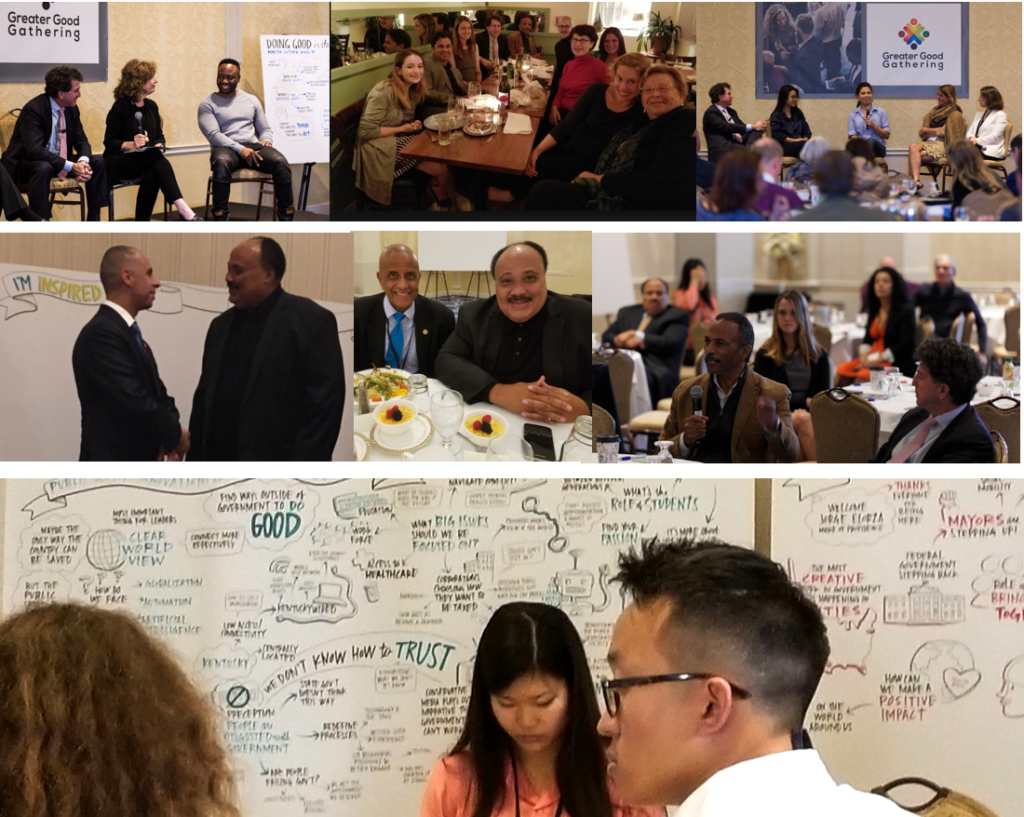
This piece was, in many ways, an unintended bookend to my reaction to the Las Vegas shootings that appeared two weeks ago. As I noted at the very beginning of Change Our Violent Culture, “Las Vegas made one thing clear: No matter the size of the massacre, nothing will lead to gun control legislation in this country.” But, I continued, “frankly, I don’t think we have a violent society because guns are readily available: Rather, guns are readily available because we are a violent society. That’s what really needs to change.” After a discussion of the constitutional and practical impediments to stricter gun laws, I turned to my central argument:
[U]ltimately, combating antisocial behavior, whether words or weapons, is, as conservatives like to assert, a matter of culture more than law…. This goes for everyone: If you’re stockpiling death-dealing weaponry, you’re part of the problem, not the solution. But if you patronize violent movies, buy products that advertise on violent TV shows, let your kids play violent video games, honor singers of violent lyrics, or vote for politicians who cynically promote firearms in bars and schools while banning them (for obvious reasons) from the government buildings where they work, then you’re part of the problem, too.
Because a nation that acted like shooting people is wrong, every day, wouldn’t also experience a mass shooting virtually every day.
I’m heartened that surprisingly large numbers of people seem to see the Greater Good initiative as a ray of hope in an otherwise dark time. Because, as always, where there’s life, there’s hope.
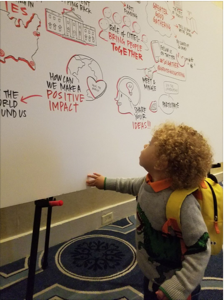
As usual, I welcome your comments below!
Sign up HERE to get my blogs directly to your inbox! Get the latest news and analysis of current events and public policy.






